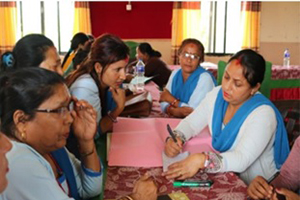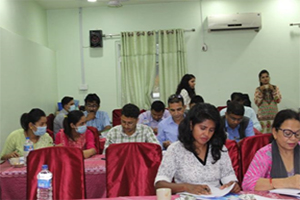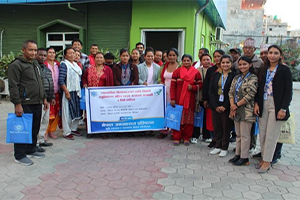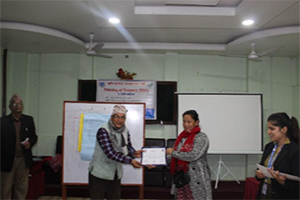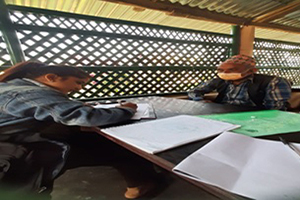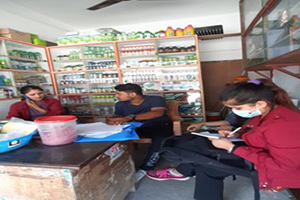
District Investment Case to improve Health System (DIC)Duration: Dec 2011 - Dec 2014 Supporting Partner: UNICEF The objective of this project was to provide technical assistance to the Ministry of Health and Population (MoHP) to successfully complete the Investment case process in the selected sixteen districts, documenting the process, analysis, and results, especially in planning and budgeting. |
Better Access and Services Provision to Improve Maternal, Neonatal Child Health Nutrition and Hygiene Service in Makwanpur (SPARSH-M)Duration: Feb 2016 - June 2018 Supporting Partner: Project HOPE The outcome of the project was to improve the health and nutrition status of mothers, neonates, and children in Makwanpur district. The overall objective was to enhance maternal and child health, nutrition, and hygiene practices by increasing access to related information and services. |
Strengthening and Activating District Health System (SAHas)Duration: 2016 Supporting Partner: UNICEF The objective of this project was to improve access and utilisation of maternal, neonatal, child health, nutrition services, and hygiene practices in the project area, along with creating awareness and improving practices on quality maternal, neonatal, child health, nutrition, and hygiene services in the community. |
Global Antibiotic Resistance Partnership – Nepal (GARP-Nepal) Phase IDuration: May 2013 - Oct 2019 Supporting Partner: Center for Disease Dynamics, Economics & Policy The objective of this project was to advocate and create awareness among policymakers about the growing threat of antibiotic resistance and develop country-relevant solutions. |
Exploring health financing options to achieve Universal Health Coverage in Nepal (Alternative Health Financing Project)Duration: Jan-Dec 2017 Supporting Partner: Medico International The objective of this project was to explore and analyse various existing financing initiatives and practices in Nepal. It also reviewed the free health care program and social health security program of the Nepal Government. |
Farming, Health and Environment Nepal Project (FHEN) Phase IIDuration: Sept 2017 - Mar 2020 Supporting Partner: Danish Society for Occupational and Environmental Health (DASAM) and Dialogos The project aimed to prevent occupational pesticide poisonings, increase awareness about pesticide treatment and prevention, and facilitate advocacy to reduce pesticide poisonings at district and national levels. |
Assessment of Auxiliary Nurse Midwives Programme in Dadeldhura District, NepalDuration: Oct 2017 - May 2018 Supporting Partner: UNICEF Nepal The objective was to assess the effectiveness of the ANM programme, factors affecting utilization of health services, and the overall impact on the community and health facilities. |
Life Saving Comprehensive Nutrition Response Including Integrated Management of Acute Malnutrition in Flood Affected Areas of Morang and Sunsari DistrictsDuration: Oct 2017 - Mar 2018 Supporting Partner: UNICEF Nepal The project aimed to build the capacity of health workers and FCHVs in managing malnutrition, promote breastfeeding, and improve essential micronutrient access for children and women. |
| Past Research | |
Overcoming Barriers to scaling up skilled birth attendants’ utilisation in improving maternal, new-born and child health in Nepal2011-2013 (Implementation Research) Supporting Partner: WHO Headquarters, Geneva This project aimed at understanding and overcoming barriers to scaling up skilled birth attendant utilization in improving maternal, newborn, and child health in Nepal. |
Exemplars in global health: Stunting reduction in Under Five children in NepalDec 2017-Aug 2018 Supporting Partner: SickKids-Canada The objective of the study was to explore stunting distribution and determinants by geographical regions and provincial states, investigate initiatives contributing to stunting reduction in various countries, and gain insights from nutrition experts and stakeholders on successful and unsuccessful strategies for reducing stunting in Nepal. |
Exemplars in global health: Reducing Under Five mortality in NepalApr-Aug 2018 Supporting Partner: University of Global Health Equity, Rwanda/Partners in Health (PIH), USA The aim of the study was to examine Nepal’s policies, strategies, and interventions to reduce causes of under-five mortality (U5M) at the national, sub-national, and community levels. It seeks to understand how these interventions were prioritised, adapted, implemented, and sustained. Additionally, the research explores the contextual factors that acted as facilitators or barriers to reducing U5M. The goal is to derive transferable knowledge to be shared with policymakers and implementers in other countries working towards reducing U5M. |
Association of Pesticide Exposure during Pregnancy and Low Birth Weight babies in the catchment area of a tertiary care hospital in Chitwan district, Nepal2019 Supporting Partner: Danish Society for Occupational and Environmental Health (DASAM) and Dialogos The aim of the study was to identify the association of pesticide exposure in mothers with low birth weight, prematurity, stillbirth, congenital anomalies, and APGAR score of their baby. |
Conducting and Evaluating Stigma reduction interventions in Sunsari and DadeldhuraJul 2017-Aug 2018 Supporting Partner: IPAS Nepal The objective of the study was to assess attitudes and beliefs about abortion and explore the barriers and constraints and opportunities about abortion among community members and health workers in selected districts of Nepal. |
Highly Hazardous Pesticide Poisoning Gathering Requisite Information for Decision-Making (HOPE-GRID). Relationship between Suicide and PesticideApril 2018 – Sept 2020 Supporting Partner: University of Edinburgh, Center for pesticide suicide prevention The objectives of the study were to identify the burden of pesticide-related admissions and mortality in Nepalese hospitals. This included examining the types of pesticides responsible for poisoning-related admissions and deaths, as well as studying the range of pesticides available in pesticide shops. |

